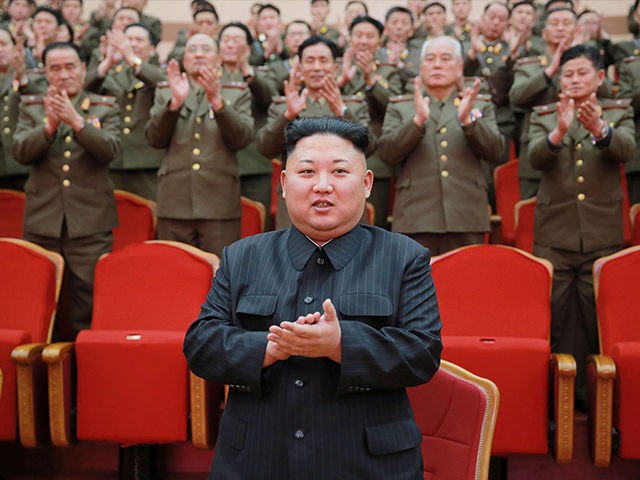This morning’s key headlines from GenerationalDynamics.com
- 38North reports that North Korea continues nuclear weapons development
- American politicians debate a ‘bloody nose attack’ on North Korea
38North reports that North Korea continues nuclear weapons development

Kim Jong-un’s sister Kim Yo-jong speaks with South Korea’s president Moon Jae-in during a Seoul theatre performance two weeks ago. News reports now indicate that Kim Yo-jong was pregnant with her second child. (Yonhap)
Based on analysis of commercial satellite imagery of North Korea’s Yongbyon nuclear facility, the U.S.-Korea Institute at Johns Hopkins University is reporting on its 38North website that North Korea has continued development of nuclear weapons capabilities, including “steady progress” on its Experimental Light Water Reactor (ELWR). The ELWR development seems to be nearly complete and “nearing operational status.”
It is widely believed that when North Korea launched its “charm offensive” and offered to participate in the Winter Olympics games being held in Seoul, South Korea, at the present time, the purpose was to gain time to continue development of nuclear weapons and long-range ballistic missiles. In particular, the North demanded that the U.S. and South Korea postpone the planned joint military drills that were to begin in late January.
While the continued development of ELWR could hardly be a surprise to anyone, it does serve to contradict the Pollyannaish views of some politicians that the Olympics Games détente might mean an end to the North Korea crisis.
The U.S. and South Korea have both confirmed that they will go ahead with the postponed joint military drills. The drills will be postponed until after the end of the Paralympics games, which run from March 8 to March 18. The start date of the drills will be announced between March 18 and April 1, according to South Korea’s defense minister. 38 North and Korea Herald and Yonhap (Seoul) and AFP and Fox News and Newsweek
American politicians debate a ‘bloody nose attack’ on North Korea
North Korea’s charm offensive and attendance at the Olympics games has postponed the crisis for a while, but the core logic driving North Korean policy has not changed:
- North Korea has been striving for over 25 years to create a nuclear weapon and ballistic missile that can target the United States.
- North Korea’s child dictator Kim Jong-un said on January 1 that this goal had already been achieved and that North Korea would forever be safe from U.S. attack. This claim is believed to be an exaggeration, but it is also believed that the goal will be achieved soon, within a few weeks or months.
- Numerous U.S. officials, including president Donald Trump, have said that North Korea will absolutely, positively not have the capability to strike the United States with a nuclear weapon.
- Kim Jong-un has said that the North will manufacture an arsenal of nuclear ballistic missiles targeting the United States. It is also clear that the North would sell this technology to anyone who wishes to buy it.
This logic has led to discussion of a “bloody nose attack.” This would be some kind of military attack that would partially destroy North Korea’s nuclear weapon and ballistic missile development, without attacking the Kim Jong-un regime itself.
A number of politicians have said that a bloody nose attack is impossible because it would invite massive retaliation against South Korea’s capital city Seoul.
Republican Senator James Risch said that lawmakers had been told “by administration people, about as high up as it gets, that there is no such thing as a ‘bloody nose strategy.'”
Risch added that Trump has been very clear on denying North Korea from obtaining the ability to strike the U.S. and that “anyone who doubts the president’s commitment to see that doesn’t happen, does so really at their own peril.”
Speaking at the Munich Security Conference on Sunday Risch said:
If this thing starts, it is going to be probably one of the worst catastrophic events in the history of our civilization, but it is going to be very, very brief. The end of it is going to see mass casualties, the likes of which the planet has never seen. It would be biblical proportion.
That is very dramatic, and it may well be true, but logic points in the opposite direction. The North would just have to accept a bloody nose attack, assuming that one is even possible, because retaliation would mean the death of Kim Jong-un and his entire government.
Still, Risch’s comments appear to be fundamentally self-contradictory. Risch says that Trump will prevent North Korea from being able to strike the U.S., as many other American politicians have also said, but Risch also says that there will be no military strike. So what’s left?
New reports from unnamed intelligence source indicate that the “bloody nose attack” will be a cyber attack. A cyber assault could cripple Pyongyang’s online communications and ability to control its military, causing huge disruption but avoiding the loss of life.
According to the reports, the U.S. government for the past six months has covertly begun laying the groundwork for possible cyberattacks on North Korea in countries including South Korea and Japan. This process involves installing fiber cables as bridges into the region and setting up remote bases and listening posts, where hackers may attempt to gain access to a North Korean internet that is largely walled off from external connections.
I do not know how much of this I believe, because the North Koreans could use redundant networks and firewalls to block such attacks. In my opinion, the most likely step in the next few months will be a U.S. conventional military attack on the North’s facilities, and there will be only minor retaliation from the North, if any. I could be wrong about either of those things, of course, but that’s my opinion at this time. Telegraph (London) and Foreign Policy and Reuters
Related Articles:
- What was Kim Yo-jong thinking as she returned to North Korea from the Olympics? (12-Feb-2018)
- North Korea’s Olympics publicity stunt gains widespread media adoration (18-Jan-2018)
- US officials plan for military strike on North Korea and war (05-Dec-2017)
- North Korea crisis: Would the United States sacrifice Los Angeles for Seoul? (18-Oct-2017)
KEYS: Generational Dynamics, North Korea, Kim Jong-un, South Korea, Experimental Light Water Reactor, ELWR, US-Korea Institute at Johns Hopkins University, 38North, James Risch
Permanent web link to this article
Receive daily World View columns by e-mail

COMMENTS
Please let us know if you're having issues with commenting.